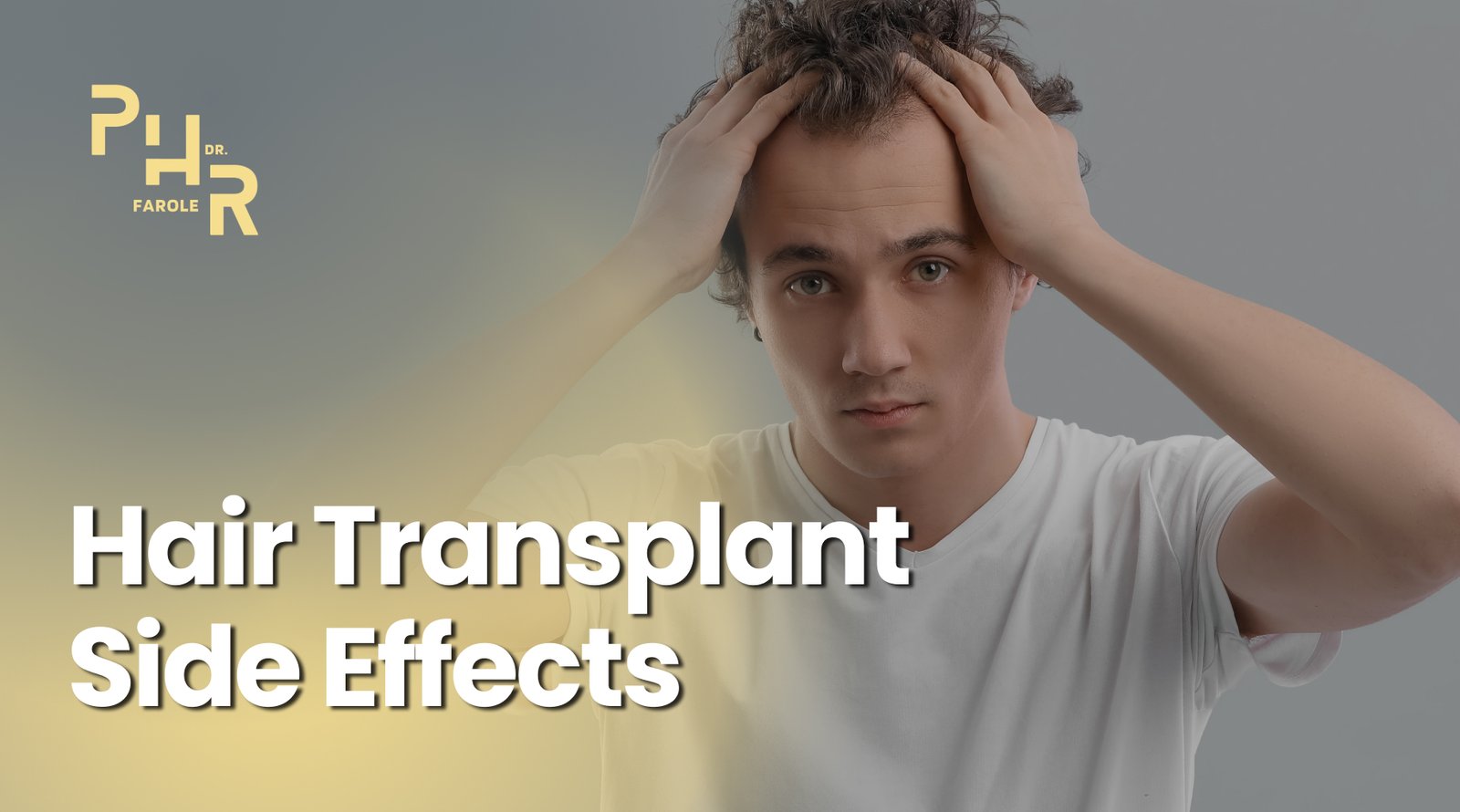INTRODUCTION
Are you considering a hair transplant but feeling uncertain about the possible side effects? Hair loss can be a sensitive issue for many people, and the promise of a full head of hair can be enticing. However, it’s important to be aware of the potential risks associated with the procedure. In this article, we’ll dive into everything you need to know about hair transplant side effects before deciding whether to move forward with the procedure. Whether you’re a resident of Philadelphia or simply curious about the topic, read on to learn more. But be warned: some of the side effects may surprise you!
The Sensitive Issue of Hair Loss
Hair loss can be a sensitive issue for many people. It can affect their self-confidence, leading to a negative impact on their quality of life.
The Promise of a Full Head of Hair Through Hair Transplantation
The promise of getting back your hair through a hair transplant can be tempting, especially for those struggling with hair loss. The procedure involves transplanting healthy hair follicles from one part of the scalp (or body) to the area experiencing hair loss. While the procedure can be successful in restoring hair growth, it is not without potential risks.
The Importance of Being Aware of the Potential Side Effects
It’s important to be aware of the potential side effects of a hair transplant when considering the procedure. Some of the most common side effects include itching, swelling, bleeding, scarring, numbness, shock loss, pain, and discomfort. Patients should discuss these risks with their surgeon and make an informed decision about whether the procedure is right for them. By being aware of the potential side effects, patients can prepare for the recovery process. In the end, a successful hair transplant with minimal side effects can provide a significant boost in self-confidence and improve one’s overall quality of life.
Common Hair Transplant Side Effects
Hair transplantation is a complex procedure that involves transplanting healthy hair follicles from one part of the scalp to the area experiencing hair loss. While the procedure can be successful in restoring hair growth, it can also have some common side effects, including:
Itching and Swelling
Itching and swelling are common side effects of getting a hair transplant. They can be uncomfortable, but they typically subside within a few days to a week.
Scarring
Scarring is a potential side effect of getting a FUT hair transplant, and it can occur in both the donor and recipient areas. The extent of scarring can vary depending on factors such as the surgeon’s skill and the patient’s individual healing process.
Numbness
Numbness in the scalp is a common side effect of getting a hair transplant, and it can last for several weeks or even months. This is because the nerves in the scalp are disrupted during the procedure, but they usually heal over time.
Shock Loss
Shock loss is a temporary side effect that occurs after the procedure. It’s characterized by the shedding of transplanted and existing hair, but it typically grows back within a few months.
Pain and Discomfort
Pain and discomfort are common side effects of hair transplant surgery, but they can usually be managed with pain medication prescribed by the surgeon.
By being aware of these common side effects, patients can prepare for the recovery process. Patients should also discuss any concerns they have with their surgeon and follow their postoperative care instructions carefully to promote optimal healing.
Rare but Serious Hair Transplant Side Effects
While most hair transplant side effects are temporary and relatively minor, there are some rare but serious side effects that patients should be aware of before undergoing the procedure:
Keloid Scarring
Keloid scarring is a type of raised and thickened scar that can occur after the procedure. This type of scarring is more common in people with a genetic predisposition to keloids, and it can be difficult to treat.
Cysts
Cysts can sometimes develop in the donor or recipient area after the surgery. These fluid-filled sacs can be uncomfortable, but they typically resolve on their own within a few weeks.
Anaphylaxis
Anaphylaxis is a severe and potentially life-threatening allergic reaction that can occur after getting a hair transplant. It is a rare side effect, but patients with a history of severe allergies should inform their surgeon prior to the procedure.
Chronic Pain
Chronic pain is a rare but potential side effect of the procedure. It can be caused by nerve damage or scarring and may require additional medical attention.
Blood Clots
Blood clots are a potential risk associated with any surgery, including hair transplant surgery. Patients should inform their surgeon if they have a history of blood clots or are taking medications to thin their blood.
It’s important for patients to discuss any concerns they have with their surgeon and to make an informed decision about whether getting a hair transplant is right for them. By being aware of the potential risks and side effects, patients can prepare for the recovery process and take steps to minimize their risk of complications.
Factors that Affect Hair Transplant Side Effects
While hair transplant surgery can be a safe and effective way to restore hair growth, there are several factors that can affect the risk of side effects:
The Experience and Skill of the Surgeon
The experience and skill of the surgeon performing the procedure can have a significant impact on the risk of side effects. Patients should choose a surgeon who has extensive experience performing hair transplants and who is certified by a reputable professional organization.
The Type of Procedure
The type of hair transplant procedure used can also affect the risk of side effects. FUE (follicular unit extraction) is a minimally invasive procedure that typically has a shorter recovery time and fewer side effects than FUT (follicular unit transplantation), which involves removing a strip of skin from the donor area.
The Condition of the Patient’s Scalp
The condition of the patient’s scalp prior to surgery can also affect the risk of side effects. Patients with pre-existing scalp conditions, such as psoriasis or eczema, may be more prone to complications and should inform their surgeon prior to the procedure.
The Patient’s Overall Health
The patient’s overall health can also impact the risk of side effects. Patients with underlying health conditions, such as diabetes or high blood pressure, may be more prone to complications and should inform their surgeon prior to the procedure.
The Aftercare
Proper aftercare is essential for minimizing the risk of side effects after the procedure. Patients should follow their surgeon’s instructions for postoperative care, including keeping the scalp clean and avoiding strenuous activity for several days after the procedure.
By considering these factors and taking steps to minimize their risk of complications, patients can improve their chances of a successful hair transplant with minimal side effects.
Postoperative Care for Minimizing Hair Transplant Side Effects
Following a hair transplant, patients can take several steps to minimize the risk of side effects and promote optimal healing:
Following the Surgeon’s Instructions for Postoperative Care
One of the most important steps patients can take to minimize hair transplant side effects is to follow their surgeon’s instructions for postoperative care. This may include keeping the scalp clean and dry, avoiding strenuous activity and exposure to sunlight, and taking any prescribed medications as directed.
Applying Ice to the Scalp to Reduce Swelling
Applying ice to the scalp can help reduce swelling and discomfort after the surgery. Patients should apply ice packs for 15-20 minutes at a time, several times a day, for the first few days after the procedure.
Avoiding Alcohol and Smoking Before and After the Procedure
Alcohol and smoking can increase the risk of complications and delay the healing process. Patients should avoid alcohol and smoking for at least a week before and after the procedure.
Taking Prescribed Pain Medication as Directed
Patients may experience some discomfort after hair transplant surgery, but taking prescribed pain medication as directed can help manage this pain and reduce the risk of complications.
Eating a Healthy Diet and Staying Hydrated
Eating a healthy, balanced diet and staying hydrated can help promote optimal healing and minimize the risk of side effects after getting a hair transplant. Patients should focus on consuming plenty of nutrient-rich foods, such as fruits, vegetables, lean proteins, and whole grains, and drinking plenty of water and other fluids.
By following these postoperative care instructions, patients can help minimize the risk of hair transplant side effects and promote optimal healing after the procedure.
The Positive Aspects of a Hair Transplant
If you’re thinking about getting a hair transplant but you’re worried about the potential side effects, it’s important to remember that there are also many benefits to the procedure. Here are some positive aspects of a hair transplant that you should consider:
Improved Appearance
One of the most obvious benefits of a hair transplant is the improved appearance. If you’re suffering from hair loss, a successful hair transplant can give you a natural-looking, full head of hair that can dramatically improve your appearance and boost your self-confidence.
Permanent Solution
Unlike other hair restoration treatments, a hair transplant is a permanent solution to hair loss. Once the transplanted hair follicles have taken root, they will continue to grow and produce hair for the rest of your life, so you won’t have to worry about going bald again.
Low Maintenance
Another great thing about a hair transplant is that it requires very little maintenance. You won’t have to worry about styling or adjusting your hairpiece, or dealing with the mess of topical solutions. With a successful hair transplant, you can simply wash, style, and enjoy your new hair as you would with natural hair.
Cost-Effective
While the upfront cost of a hair transplant can be high, it’s important to consider the long-term cost savings. With a permanent solution to hair loss, you won’t have to keep paying for expensive hair pieces or topical solutions for the rest of your life. In the long run, a hair transplant can actually be a cost-effective solution to hair loss.
Improved Quality of Life
Finally, a successful hair transplant can improve your overall quality of life. Hair loss can be a major source of stress and anxiety, and can even lead to depression. With a full head of hair, you can feel more confident and comfortable in your own skin, which can lead to a happier, healthier life.’Finally, a successful hair transplant can improve your overall quality of life. Hair loss can be a major source of stress and anxiety, and can even lead to depression. With a full head of hair, you can feel more confident and comfortable in your own skin, which can lead to a happier, healthier life.
Conclusion: Be Informed and Make the Best Decision for You
In summary, while it’s important to be aware of the potential side effects and risks associated with a hair transplant, it’s equally important to keep in mind that many people undergo the procedure with minimal complications and excellent results. With the right surgeon, procedure, and aftercare, the benefits of a successful hair transplant can be truly life-changing.
At Philadelphia Hair Restoration, we understand the concerns you may have about the procedure and are here to guide you every step of the way. Our team of experienced hair transplant specialists will work with you to determine the best course of action for your unique situation and provide personalized care throughout your hair restoration journey.
Don’t let hair loss affect your quality of life any longer. Schedule a consultation with us today and take the first step towards achieving the full head of hair you deserve.



